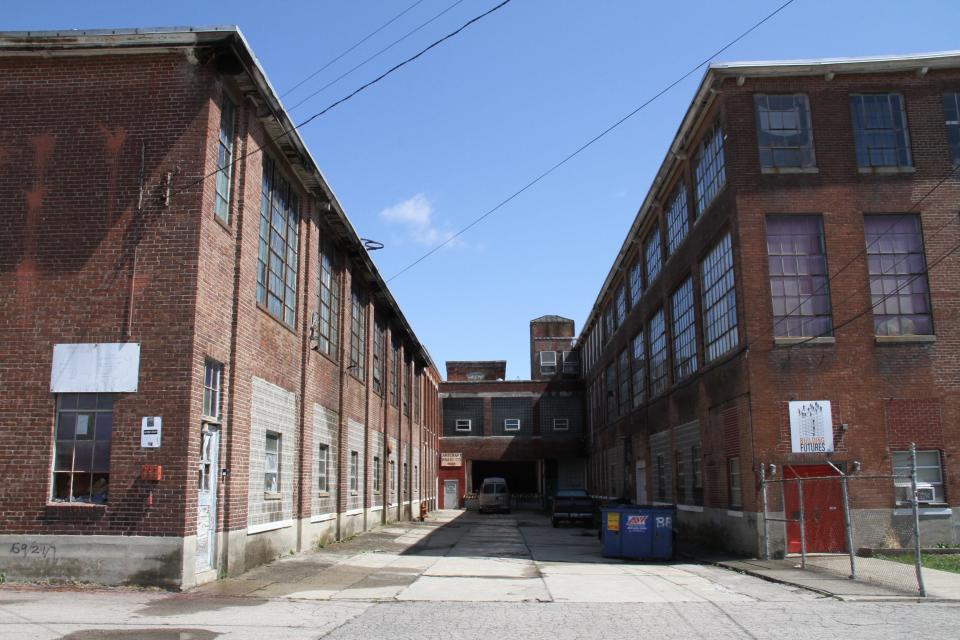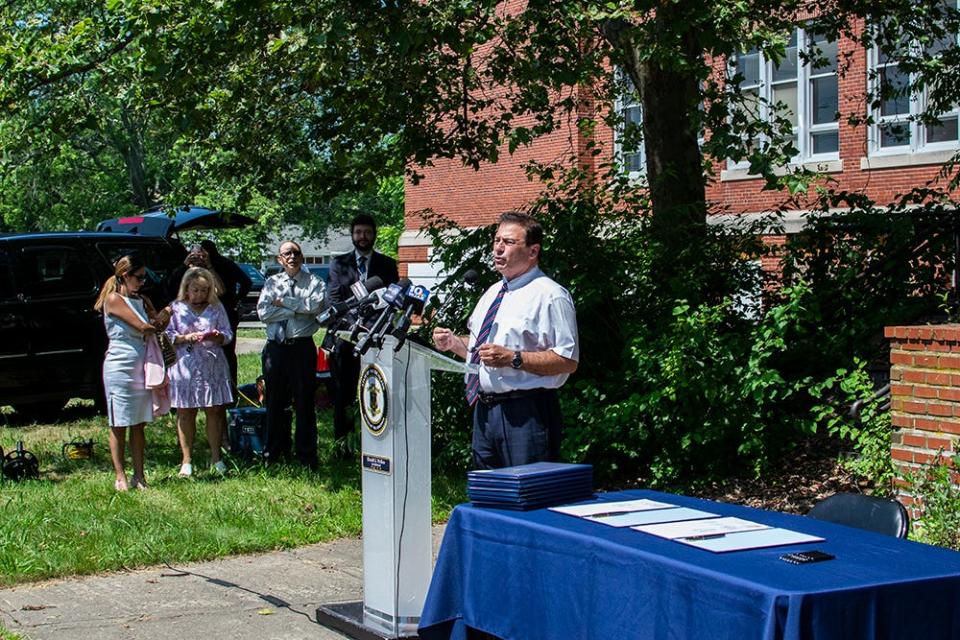Thirteen housing laws will go into effect Jan. 1 2024. Here's what they do.
WARWICK − Gov. Dan McKee held a ceremonial signing Wednesday for a stack of housing bills that promise to tweak the landscape for developers and municipalities while offering potential for greater density.
Among the highlights of changes coming to cities and towns are the requirements of higher density housing developments when at least some of the project has affordable housing, that commercial buildings can be turned into residences by right and the banning of rental application fees.
The bills had already become law in late June. McKee held the ceremonial signing in front of the former Aldrich Junior High School, its entrance overgrown with vines. The former school is slated to become senior housing.

What impact will the housing bills have?
All of the bills will not take effect until Jan. 1, 2024, which gives municipal leaders a little time to digest the implications of the new laws. Here's how each one could impact Rhode Islanders.
Allow conversions of non-residential buildings: Signed by the governor, H6090/ S1035 gives developers the right of "adaptive reuse" to turn former commercial and institutional buildings into housing, unless there is an environmental restriction. Projects will also limit off-street parking requirements to one space per residential unit, and for projects with adequate access to utilities and at least 20% income-restricted housing, no fewer than 15 units per acre.
Housing options: RI is trying to make it easier to transform schools, churches or malls into housing
Banning rental application fees: H6087 and S311 prohibit landlords from charging for a rental application fee.
Transit-oriented development pilot program: S1052 creates a pilot program for dense residential developments around transit centers, like the MBTA and Amtrak train stations, as well as bus stops. Massachusetts recently began to require cities and towns with transit stops to create 50-acre zoning districts that allow denser multi-family developments near transit centers, like light rail and commuter rail stations.
Increase by-right density of affordable housing projects: H6081 and S1037 do two things. First, they increase the by-right density of projects with affordable housing. At 25% affordable units, a developer gets five units per acre, increasing to 9 units per acre at 50% affordable and 12 units per acre for 100% affordable projects. The increase in minimum units is different for the few municipalities and areas not served by sewer systems.
Second, the law will limit the number of meetings required to approve a project to two, down from three. The first stage of a project application, the master plan phase, has been eliminated.
Density bonuses for municipalities with inclusionary zoning: H6058 and S1052 give a density bonus to projects proposed in towns with inclusionary zoning ordinances. Inclusionary zoning means developments are required to have a certain number of income-restricted units. A 2022 Housing Fact Book report found 16 municipalities had inclusionary zoning rules on the books. The new law requires 25% of all units to be affordable and gives a density bonus of two market-rate units for each income-restricted unit.

Housing expert Salim Furth at the Mercatus Center at George Mason University wrote that he analyzed all of the inclusionary zoning ordinances in the state.
"The majority require 20% of new units to be affordable," Furth wrote in a blog post about the package of bills. "Few provide a density bonus big enough that the number of market rate units matches the base zoning density, let alone exceeding it as S1051 requires. Presumably, these noncompliant ordinances must now be amended to comply with the new law."
Reducing hearing notice requirements: H6086 and S1038 drop the requirement that abutters to developments be notified of hearings via certified mail, in favor of first-class mail.
Eliminating the state Housing Appeals Board: Two separate sets of bills, H6060/S1053 and H6083/S1050, dissolve the state's Housing Appeals Board and replace it with a dedicated land use docket in the Superior Court.
Requiring comprehensive plan updates: H6085 and S1033 require municipalities to update their comprehensive plans every five years, and any plan older than 12 years can't be used to deny a zoning change.
Overhauling site plan review: H6061 and S1034 require that site plan reviews be done under "specific and objective guidelines" and increases the size of minor land development projects from five units to nine units.
Legacy lots legalized: H6059 and S1032 allow lots that were once legally zoned to be buildable again. That means if a community increased its minimum lot size for a house from 10,000 square feet to an acre, the 10,000-square-foot lot would be buildable again.
Fight brewing next year over accessory dwelling units
The only bill in House Speaker K. Joseph Shekarchi's package that did not pass the Senate would have made it easier to add accessory dwellings to properties. The bill would have let property owners add a separate housing unit within the footprint of their house, garage or other outbuilding without limiting its use to family members. On lots a half acre or larger, they would have been allowed to build new detached housing units without special permission.
During the bill signing, Shekarchi said he will reintroduce the accessory dwelling unit (ADU) early in next year's session so it is more likely to pass through the Senate.
Thanks to our subscribers, who help make this coverage possible. If you are not a subscriber, please consider supporting quality local journalism with a Providence Journal subscription. Here's our latest offer.
Reach Wheeler Cowperthwaite at wcowperthwaite@providencejournal.com or follow him on Twitter @WheelerReporter.
Editor's note: This story has been updated to reflect that the event was a ceremonial signing and that the bills had already become law.
This article originally appeared on The Providence Journal: Rental application fees ban and other housing laws in RI signed by governor

